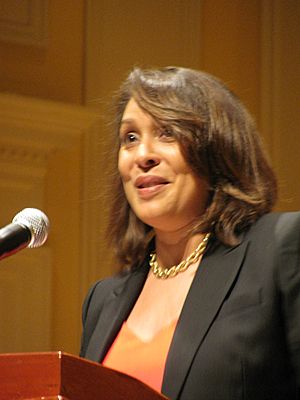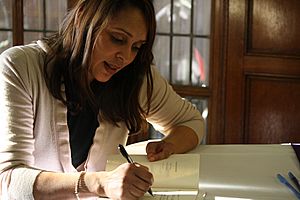Natasha Trethewey facts for kids
Quick facts for kids
Natasha Trethewey
|
|
|---|---|

Trethewey reading at the Library of Congress in 2013
|
|
| Born | April 26, 1966 Gulfport, Mississippi, U.S. |
| Occupation | Poet, professor |
| Education | University of Georgia (BA) Hollins University (MA) University of Massachusetts, Amherst (MFA) |
| Genre | Poetry |
| Notable awards | Bobbitt National Prize for Poetry (2020) Heinz Award (2017) Pulitzer Prize for Poetry (2007) Cave Canem Poetry Prize (1999) |
| Spouse | Brett Gadsden |
| United States Poet Laureate | |
| In office 2012–2014 |
|
| Preceded by | Philip Levine |
| Succeeded by | Charles Wright |
| Poet Laureate of Mississippi | |
| In office 2012–2016 |
|
| Preceded by | Winifred Hamrick Farrar |
| Succeeded by | Beth Ann Fennelly |
Natasha Trethewey (born April 26, 1966) is a famous American poet and professor. She was the United States Poet Laureate from 2012 to 2014. This is a special role where a poet is chosen to represent the country. She also won the important Pulitzer Prize in Poetry in 2007 for her book Native Guard. She was also the Poet Laureate of Mississippi.
Today, Trethewey is a professor of English at Northwestern University. Before that, she taught at Emory University for many years. In 2019, she became a member of the American Academy of Arts and Letters. She also became a Chancellor of the Academy of American Poets. A fellow poet, David St. John, said she is a "master" who writes about important topics. These topics include fairness and history in America.
Contents
Early Life and Family
Natasha Trethewey was born in Gulfport, Mississippi, on April 26, 1966. Her parents were Eric Trethewey and Gwendolyn Ann Turnbough. Her parents had to travel to Ohio to get married. This was because it was against the law in Mississippi for people of different races to marry at that time. This was a year before the U.S. Supreme Court made such laws illegal across the country.
Natasha's mother, Gwendolyn Ann Turnbough, was a social worker. She was a big inspiration for Natasha's book Native Guard. Natasha's parents divorced when she was six years old. When Natasha was 19, her mother passed away tragically. Natasha has said that this sad event made her want to become a poet. She turned to poetry to understand what had happened.
Her father, Eric Trethewey, was also a poet and a professor. He taught English at Hollins University. Natasha Trethewey is married to a historian named Brett Gadsden.
Education and Learning
Natasha Trethewey studied English at several universities. She earned her first degree, a B.A., from the University of Georgia. Then, she earned a M.A. in English and Creative Writing from Hollins University. She later earned a M.F.A. in poetry from the University of Massachusetts Amherst in 1995.
She has also received special honorary doctorates. These are degrees given to people to honor their achievements. She received one from Hollins University in 2010. She also received one from Delta State University in her home state of Mississippi.
Exploring Her Poetry

Natasha Trethewey's poems often mix different styles. She uses free verse, which doesn't have a strict rhyme or rhythm. But she also uses traditional forms like the sonnet and the villanelle. Her poems often explore "memory and the racial legacy of America." This means she writes about how the past affects people today, especially concerning race.
Her poems have appeared in many well-known publications. These include The Best American Poetry, American Poetry Review, and The Southern Review. Her work was also in the 2019 book New Daughters of Africa.
Her first poetry book, Domestic Work (2000), won the Cave Canem Poetry Prize. This award is for a first book by an African-American poet. The book looks at the lives of black men and women in the Southern United States.
Another book, Bellocq's Ophelia (2002), is a collection of poems that tell a story. It's about a fictional mixed-race woman in early 20th-century New Orleans.
Her book Beyond Katrina (2015) tells about the terrible events after Hurricane Katrina hit the Mississippi Gulf Coast. She writes about how her friends, family, and neighbors were affected. Her writing in this book includes themes of race, family memories, and the economic problems caused by the hurricane. She also includes her poetry and pictures to help readers understand the events.
The American Civil War is a common topic in her work. Natasha was born exactly 100 years after Confederate Memorial Day. She says she "could not have escaped learning about the Civil War." For example, her 2006 book Native Guard tells the story of the Louisiana Native Guards. This was an all-black regiment in the Union Army during the Civil War. They were mostly former slaves who joined the army.
United States Poet Laureate Role
On June 7, 2012, Natasha Trethewey was named the 19th United States Poet Laureate. This is a very important role for a poet in the U.S. The Librarian of Congress, James H. Billington, chose her. He said her poetry had a "classic quality" and showed the "human tragedy" of history.
Unlike many poets laureate, Trethewey was in the middle of her career when she was chosen. She was also the first laureate to live in Washington, D.C. during her term.
Trethewey was appointed for a second term as US Poet Laureate in 2013. During this time, she worked on a project called "Where Poetry Lives" for PBS News Hour. She gave her final lecture as Poet Laureate on May 14, 2014.
Awards and Honors
Natasha Trethewey has received many awards for her writing. Here are some of them:
- 1999: Cave Canem Poetry Prize for Domestic Work
- 1999: Literature Fellowship from the National Endowment for the Arts
- 2007: Pulitzer Prize for Poetry
- 2012: Poet Laureate of Mississippi
- 2012: United States Poet Laureate
- 2017: Heinz Award in the Arts and Humanities
- 2020: Bobbitt National Prize for Poetry for Lifetime Achievement
- 2021: Anisfield-Wolf Book Award for Memorial Drive

